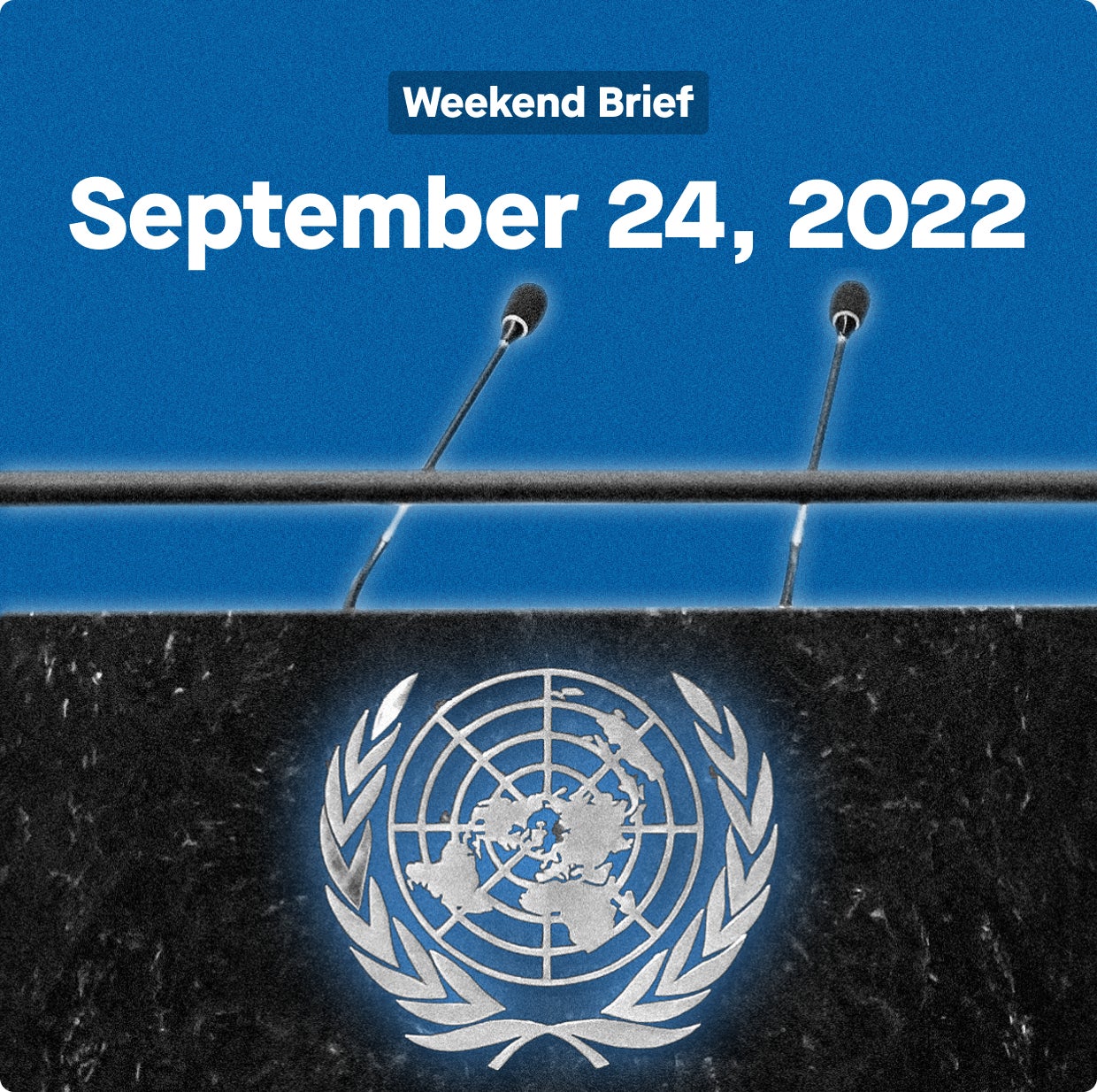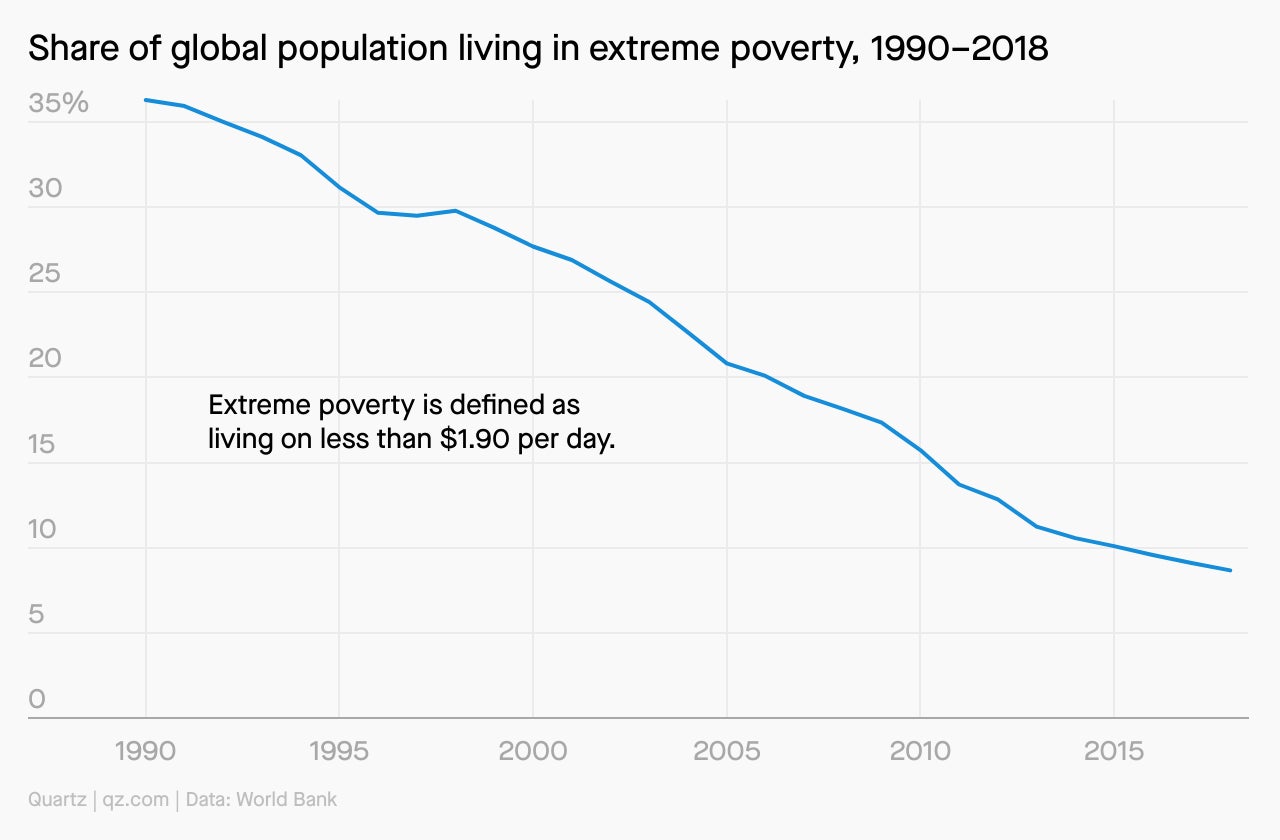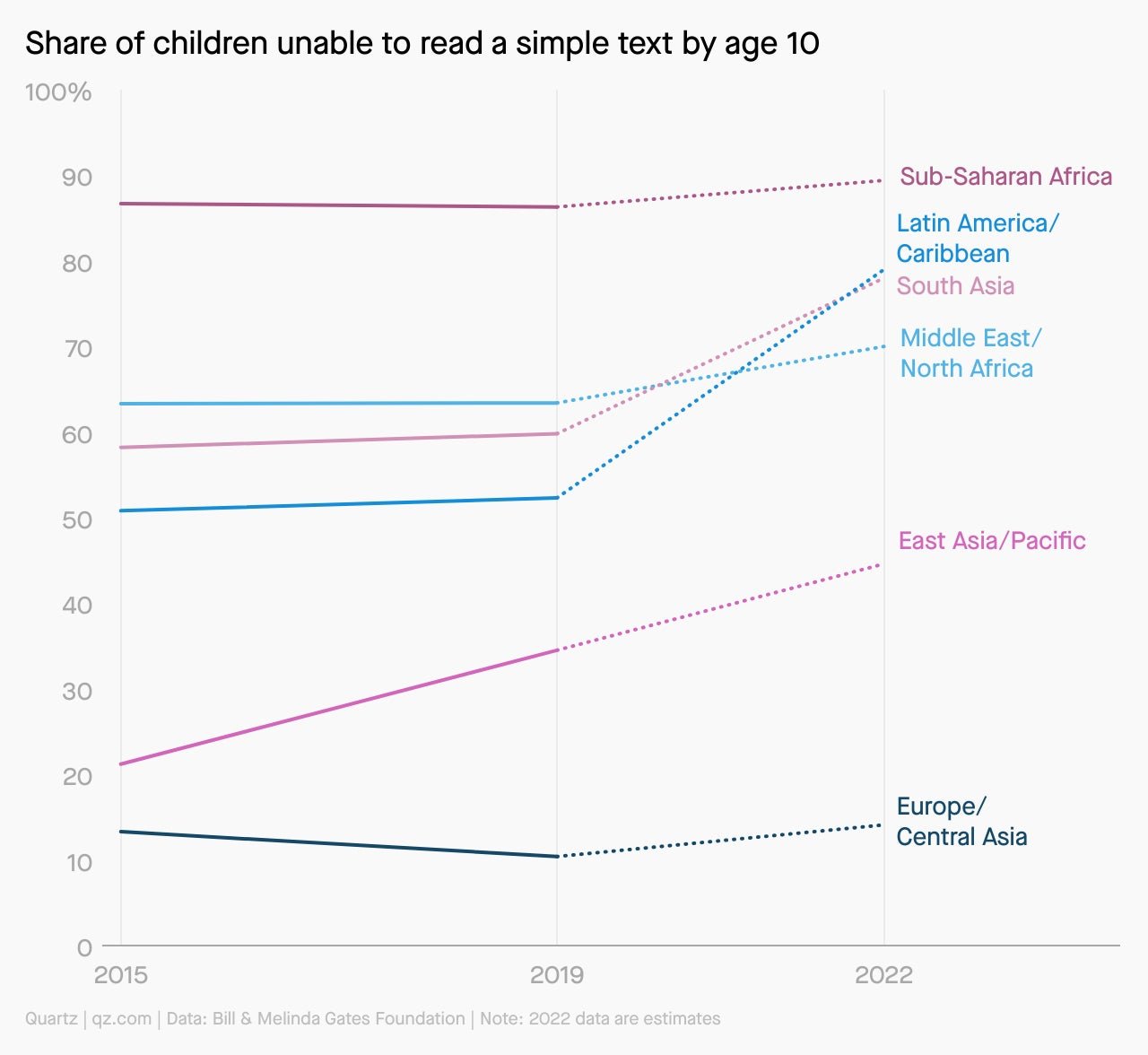What good is the UN?
The UN General Assembly offered a defence of multilateralism.


Hi Quartz members,
Against all odds and widespread critiques, faith in multilateralism abounds, especially during the UN General Assembly. And you would be hard-pressed to find a more dedicated champion than Mark Malloch-Brown, former UN deputy secretary general, who has devoted more than four decades of his career to the cause.
A veteran of the World Bank, the UN Development Programme, and the UN Foundation, Malloch-Brown, who also served in the British government from 2007 to 2009 as the minister responsible for Africa and Asia, is today the president of George Soros’s Open Society Foundations. We caught up with him on the sidelines of the UN General Assembly. The following excerpt of the interview has been edited for length and clarity. Quartz will run the full interview in the coming days.
QZ: Since we saw you at Davos: Would you say anything has been, if not solved by multilateral institutions, then at least furthered by them, on any of the big issues you care about?
MMB: I think multilateralism has been bumping along with some pass grades—not many “A” grades. The UN secretary-general’s grain deal was very influential and having the IAEA inspectors on the [Ukraine] nuclear facility was also important.
What you’re seeing is a UN which has been more engaged and animated versus the shock with which it greeted the [Russia-Ukraine] conflict initially. And the Bretton Woods institutions have been moving on the equally important economic side.
So I think they have been good on consequences [but] completely absent on causes. They just can’t get at the causes because they don’t have the consent in the Security Council to do so. So it still seems to be shaping up as a “cold war” UN, where it’s active on humanitarian [issues], active on technical tasks like inspections of nuclear weapons or facilities, but not in the political inner kitchens because there isn’t the consensus amongst major powers to allow it to act there.
But one little silver lining was Biden’s sort of conversion on UN Security Council reform. The US, which has always been the most immovable on this, suddenly is seeing virtue in reform.
And that’s because of Russia’s invasion of Ukraine?
It has really stirred the embers of Security Council reform. I’m not sure they’re going to catch fire and the world is going to change, but at the margins, this is good.
So you still have faith in multilateralism?
I do, because however imperfect the results, it remains the only serious way to address issues which simply just don’t lend themselves to national solutions.
In a way, the case for multilateralism looks stronger than ever, partly because of the pigheadedness and head-in-sand approach of so many national governments. But of course, it is that approach of national governments which has led to the crisis of multilateralism. I mean, multilateralism is not an alternative to bad national governments. It is intergovernmental. It requires governments to share values and approaches, and in the case you find common ground between each other, coming together to drive shared solutions.
What issues is multilateralism best placed to solve?
One of the things I went to this week was the Pacific islands meeting, around the devastating impact of these islands that are sinking under. They have impeccable climate credentials and are living completely within the Paris boundaries. But it doesn’t make a toss of difference because it’s our emissions which are driving [climate change].
It’s incredibly difficult to wake the world up and into consciousness about what its activities are doing to these people on islands literally on the other side of the world. But of course, it starts with those islands and then it comes roaring back to places like New York, where I’m sure you know of people whose apartments have flooded and so forth.
With the joined-upness of this, the way the damage is spreading, one country’s salvation doesn’t live within its own boundaries. Even if the US did everything John Kerry wanted domestically, there’s still going to be a threat to New York or coastal Florida unless there’s action across the world.
Climate is not exceptional in that way. Whether it’s addressing migration flows or the state of the global economy, these things no longer lend themselves to strictly national solutions.
GOOOOOOALLLLLLLLL
In 2015, the UN member nations agreed to the Sustainable Development Goals, a series of ambitious targets meant to reduce poverty, fight inequality, and halt climate change by 2030. Throughout UNGA, Quartz examined a few of them to see how they’re going (spoiler: overall, not great).
The very first of the 17 goals was: “No Poverty.” Simple, but ambitious, its aim is to end poverty in all its forms everywhere. Until recently, the trend in poverty reduction looked good. The fraction of people living in extreme poverty around the world dropped from 36% in 1990 to 10% in 2015. Extreme poverty is defined as those living below the International Poverty Line of $1.90 or less per day.

Unfortunately, covid-19 has reversed the progress. Forecasts suggest the global poverty rate increased from 8.3% in 2019 to 9.2% in 2020, which would be the first rise in extreme poverty since 1998. This jump means an additional 93 million people around the globe entered poverty because of the pandemic.
Covid also affected another goal: quality education. Global lockdowns meant approximately 147 million children missed out on in-person instruction. Since then, learning poverty, or the proportion of children who cannot read and understand a basic text by the age of 10, has increased in every region of the world. Before the pandemic, the rate of learning poverty was 57% in low- and middle-income countries. Projections suggest that number is now 70%.

Of course, learning poverty isn’t the only way to measure the effectiveness of the goal, but other indicators don’t look great either. For example, math and reading proficiency for boys and girls continues to fall short of levels needed to meet the 2030 target.
What’s the solution to the world’s pressing problems?
“I think money. Everything else is second order.”—Nobel prize-winning economist Abhijit Banerjee has a simple answer to a complex question. Read about his reasoning here.
Bill Clinton seems tired of talking
In an uncharacteristically brief keynote at the Clinton Global Initiative (back on the UNGA sidelines after a six-year hiatus), the famously loquacious former US president suggested the world has had enough discussion merely identifying its urgent problems. “We even know, usually, what are the most effective ways to address the challenges,” Clinton said.

The question, which he put to the CGI audience in the midtown Hilton’s massive ballroom, is how to turn an abundance of good ideas for solutions into real change. “When it’s all said and done,” Clinton said, “I think that unless you can answer the ‘how’ question, the rest of it doesn’t amount to much.”
He also warned against letting gridlock and polarization overwhelm the effort. “Nobody has to do anything except figure out how to work with someone else to make good things happen,” Clinton said. “I think there’s been quite enough of the other stuff.”
CGI goers responded in ways large and small, whether dutifully (and in some cases happily) filling their buffet lunch plates with miso-glazed tofu and ancient grains salad, or announcing millions of dollars of commitments to improve the world. But will the momentum continue after the delegates have left Manhattan?
José Andrés, the famed Spanish chef whose World Central Kitchen has become a vital responder to calamities around the world by getting food to people affected by war or natural disasters, suggested the Clinton imprimatur could help sustain the momentum. When Clinton was president, he once mentioned Andrés by name in a speech. “I was 26,” said the chef, 53, who was not yet the celebrated philanthropist he has since become. “It gave me this kind of extra strength to say, ‘You know, we can do more.’”
💻 Are companies keeping up with the rapid advancements in workplace technologies? An expert panel, assembled by Quartz at Work, will discuss what modern workplaces need—and how they’re falling short. Sign up here for the virtual event at 12-1pm EDT / 4-5pm GMT on Sept. 30, 2022.
The UNGA’s alphabet soup
As in years past, the UNGA program has been reliably rife with confusing event titles that are heavy on jargon and acronyms. As per Quartz’s tradition, we selected some of the most egregiously inscrutable ones, and attempted a plain-English translation.
Actual event: Partnering for Action: Implementation of the Global Accelerator on Jobs and Social Protection for Just Transitions
*Translation: We need more good jobs in poor countries, quickly
*Trucks are polluting and expensive, so we thought we’d combine shipments to save money and emissions
*Powerful people will soon be invited to discuss Primary Health Care and Universal Health Coverage, drinks will be served
*Team work makes the dream work
*Digital spaces would be less sexist and racist if women and people of color had more power over them
*Where to find money to save the bees
QUARTZ STORIES TO SPARK CONVERSATION
- Europe is replacing energy dependence on Russia with solar reliance on China
- King Charles’ real estate empire is a powerful climate tool
- The president of the World Bank isn’t sure climate change is real
- New York’s fraud case against Donald Trump is all about exaggerating his wealth
- Pressure is rising for western countries to lift sanctions against Zimbabwe
- Europe is counting on floating gas terminals to get through the winter
5 GREAT STORIES FROM ELSEWHERE
🛠️ Under maintenance. “Maintenance” might be a better framework to tackle climate change than sustainability, says Alex Vuocolo in Noema Magazine. Unlike sustainability, which focuses on reduction and moderation, maintenance focuses on making things last. By recognizing our entanglement with sprawling industrial systems, like subways and power grids, Vuocolo argues we could inject more concrete pragmatism into lofty green transition goals.
💸 What’s the pay? Pay transparency causes behavioral changes. At an organizational level, as with North America’s hockey league, it can hurt team performance, while at the national level, as with Norway, it can impact citizens’ happiness. The Wall Street Journal considers how wage disclosure might impact the workplace, especially as states like New York and California are poised to pass new legislation this fall.
🥱 Yaaawwnn. Some social media platforms get boring, and there’s a simple equation to understand why. Russell Brandom lays out the math in a piece for The Verge, describing the “boom and bust” content cycle that platforms like Instagram, and now TikTok, have gone through. The trick is to maintain unique content creators, while keeping bootleggers in check—a balancing act that Twitter and Reddit have down pat.
👽 Technosignatures. As the hunt for intelligent life in the universe continues, astrophysicists are developing a field of study centered around “technosignatures.” These are collections of signs, such as electromagnetic fluctuations, that might indicate that advanced civilizations exist on distant worlds. As The New York Times reports, an organization called CATS, or Categorizing Atmospheric Technosignatures, is spearheading this new scientific discipline.
🌃 Night hawkers. Shanghai lifted a 20-year ban on streetside businesses this week. The move coincides with a growing popularity in street vending and night markets in China, as some city-dwellers, disillusioned with a grinding work culture, opt to embark on their own entrepreneurial ventures. Sixth Tone tells the story of how this often deemed “low-status job” is slowly making a comeback among China’s younger generations.
Thanks for reading! And don’t hesitate to reach out with comments, questions, or topics you want to know more about.
Have a weekend of world peace,
— Heather Landy, executive editor; Amanda Shendruk, things reporter; Annalisa Merelli, senior reporter; and Morgan Haefner, deputy email editor
Additional contributions by Alex Citrin-Safadi, Julia Malleck, and Samanth Subramanian